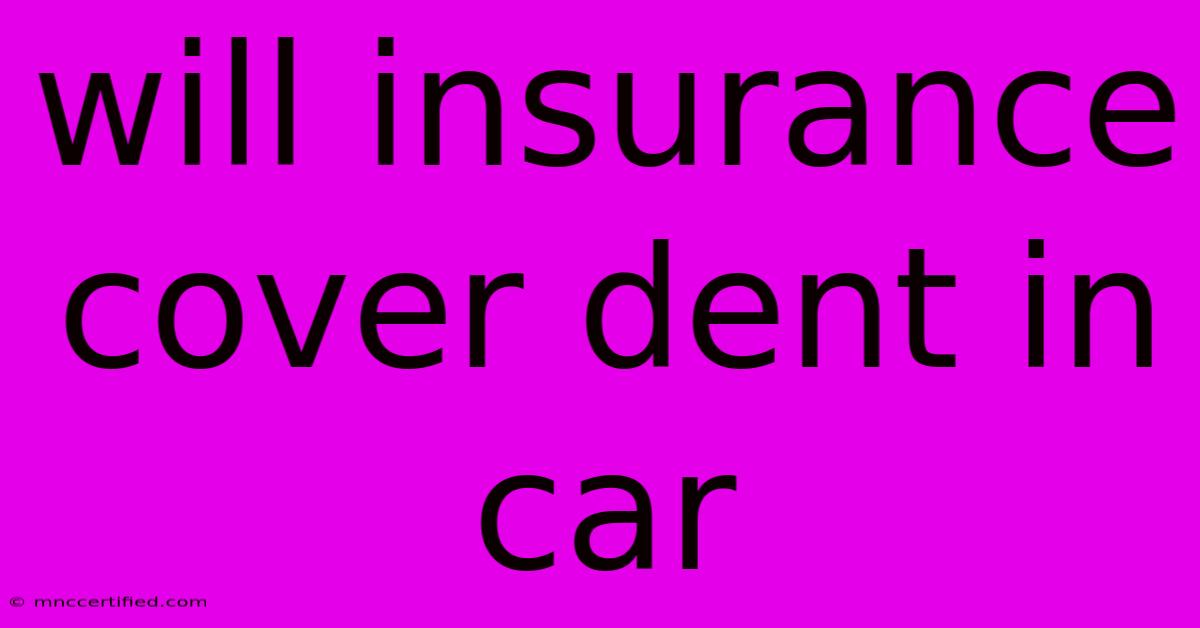Will Insurance Cover Dent In Car

Table of Contents
Will Insurance Cover a Dent in My Car? A Comprehensive Guide
Getting a dent in your car is frustrating, but will your insurance cover the repair? The answer isn't a simple yes or no. It depends on several factors, including the type of insurance coverage you have, the cause of the dent, and the terms and conditions of your policy. This comprehensive guide will help you understand what to expect.
Understanding Your Car Insurance Coverage
Most car insurance policies offer two main types of coverage relevant to car damage:
-
Collision Coverage: This covers damage to your car caused by a collision with another vehicle or object, regardless of fault. This is the most likely coverage to pay for a dent, but there are exceptions. Collision coverage usually has a deductible, meaning you'll pay a certain amount out-of-pocket before the insurance kicks in. The higher your deductible, the lower your premium, but you'll pay more if you need to file a claim.
-
Comprehensive Coverage: This broader coverage protects your car from damage caused by events other than collisions, such as hail, vandalism, fire, theft, or hitting an animal. A dent from a falling tree branch or a shopping cart hitting your car in a parking lot would likely be covered under comprehensive, again, subject to your deductible.
What about uninsured/underinsured motorist coverage? This coverage only applies if another driver is at fault and doesn't have adequate insurance. It won't cover damage from accidents where you're at fault or incidents not involving another vehicle.
When Your Insurance Likely Will Cover a Dent
Your insurance is more likely to cover the cost of repairing a dent if:
- The damage resulted from a collision: If you hit another car, a wall, or another object, collision coverage will likely cover the repair, minus your deductible.
- The damage resulted from a covered comprehensive event: If a hail storm caused multiple dents, or a tree fell on your car, comprehensive coverage should step in.
- The dent is significant: Minor scratches or very small dents might not be worth filing a claim for, given the deductible. It's often more cost-effective to pay for minor repairs yourself.
- You've reported the incident promptly: Most insurance companies require you to report the incident as soon as reasonably possible. Delays can impact your claim.
When Your Insurance Likely Won't Cover a Dent
There are several scenarios where your insurance company may deny your claim for dent repair:
- The damage is minor and cosmetic: As mentioned before, tiny dents that don't affect the car's functionality might not be worth claiming.
- You are at fault for a minor accident: If you caused the dent in a low-impact incident and repairs are inexpensive, your insurance might deem it not worth filing a claim.
- You haven't met your deductible: Remember, you'll have to pay your deductible before the insurance company covers the rest.
- The dent was caused by something not covered by your policy: A dent from a deliberate act of vandalism might be covered by comprehensive, but a self-inflicted dent (e.g., backing into a pole) would generally not be covered.
- You failed to report the incident promptly: Insurance companies have timelines for reporting incidents. Failing to adhere to these timelines could void your claim.
Tips for Filing a Claim for Dent Repair
- Document the damage: Take clear photos and videos of the dent from multiple angles.
- Report the incident to your insurance company immediately: Follow their procedures carefully.
- Obtain a repair estimate from a reputable body shop: Your insurance company may have preferred providers.
- Be honest and accurate when providing information: Any discrepancies can impact your claim.
- Understand your policy: Review your policy documents carefully before filing a claim.
Conclusion
Whether or not your insurance covers a dent in your car depends heavily on the specifics of your policy, the cause of the damage, and the extent of the damage. Review your policy details carefully, and don't hesitate to contact your insurance provider directly if you have questions or need clarification. Understanding your coverage can save you money and frustration in the long run. Remember to always drive safely to minimize the risk of damage!

Thank you for visiting our website wich cover about Will Insurance Cover Dent In Car. We hope the information provided has been useful to you. Feel free to contact us if you have any questions or need further assistance. See you next time and dont miss to bookmark.
Featured Posts
-
Shelter Insurance Mt Sterling Ky
Nov 22, 2024
-
Fb Taylor Insurance Nederland Tx
Nov 22, 2024
-
Business Insurance Huntsville Al
Nov 22, 2024
-
An Interview With Reverend Richard Coles
Nov 22, 2024
-
Steelers Browns Game Live Updates And Tv
Nov 22, 2024